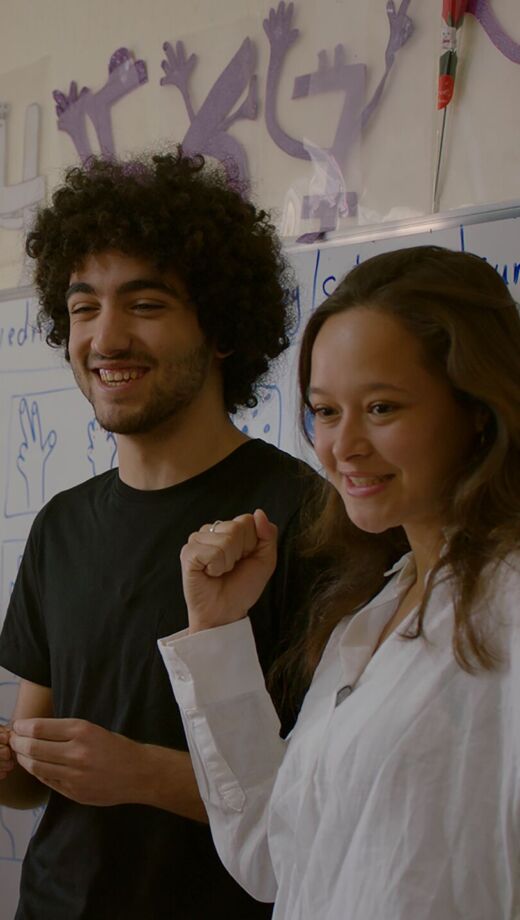
Activist Outreach Programme
Movies that Matter supports the protagonists from the Activist documentaries during their stay at the festival with a networking and impact programme. We also offer them a stage at screenings and in the media. Even after returning from the festival, we continue to support the activists. With our Activist outreach and impact funding, we facilitate screenings in their home countries and create more awareness for the film and the activists’ work.
Projects
-
Abortion Dream Team
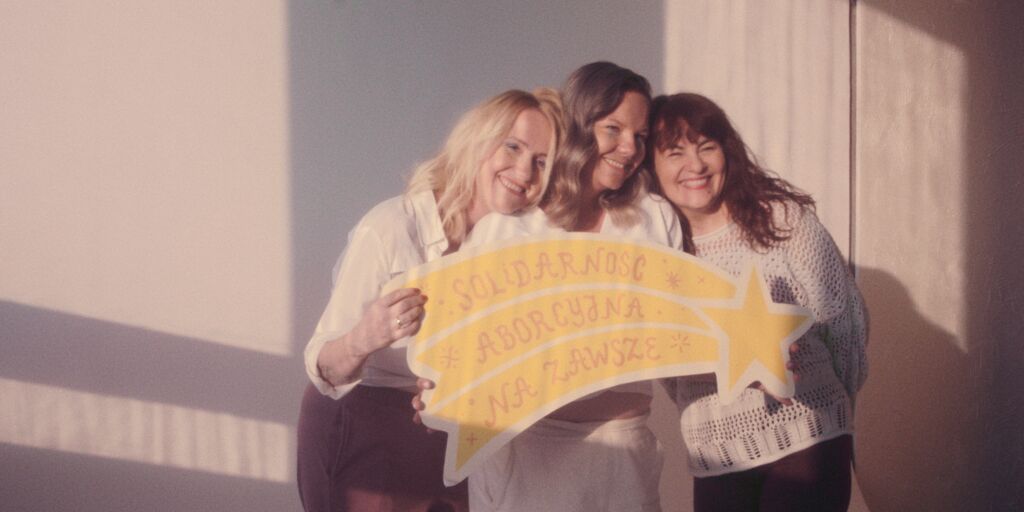
The documentary follows four women fighting for abortion rights in Poland, a country with strict anti-abortion laws. One of them, Justyna Wydrzyríska, is criminally charged with ‘intent to aid an abortion’. While Justyna’s case attracts international attention, it also brings back her own past trauma and reveals deeply rooted motives for her activism.
Outreach Project
In Uganda, abortion is also highly stigmatised and legally restricted, despite increasing public health risks caused by unsafe procedures. Borne out of a collaboration sparked at the Movies that Matter Festival, where Ugandan filmmaker Trinah Kakyo and Polish director Karolina Domagalska first connected, The Dreaming Abundance initiative bridges Ugandan and Polish perspectives on reproductive rights.The project responds to this urgent human rights issue by integrating abortion awareness and storytelling into the Uganda Human Rights Film Festival (UHRFF), the country’s first queer-led human rights film platform. The programme offers a safe, culturally-sensitive and artistically bold approach to shift the narrative around reproductive justice.
At its heart is the screening of the Abortion Dream Team documentary, followed by live discussions with filmmakers and community health workers. Surrounding activities, such as workshops, multilingual care kits, safe-space circles, and feminist art performances, create safe, culturally sensitive spaces to engage with issues of bodily autonomy, health equity, and freedom of expression. These events will take place in Kampala across three venues: an international school, a cultural hub and a cinema space.
Devi
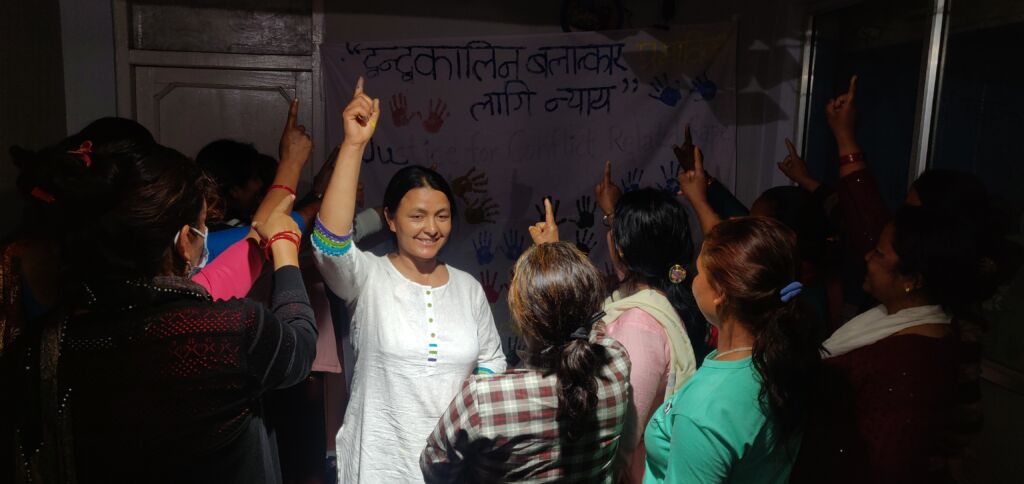
Nepalese Devi Khadka realises her story as a wartime rape survivor – like the stories of thousands of women like her – is being erased from history. She decides she won’t let that happen. In her thoughtful, quietly determined way, Devi takes her demand for accountability to the highest political level.
Outreach Project
The outreach plan expands the impact of the Devi documentary by bringing it to remote, war-affected communities across Nepal. Following its successful 2025 cinema release, the campaign will host 18 free screenings in provinces such as Rolpa, Rukum, Doti, and Jumla with discussions led by Devi Khadka, director Subina Shrestha, and the Aparjit team to reach survivors of conflict-related sexual violence and raise awareness about the Truth and Reconciliation (TRC) Act. The programme’s objectives are to spark national and local conversations on conflict-related sexual violence (CRSV), mental health, and accountability; reduce stigma and victim-blaming; and advocate for survivor-centered policies.Mother City
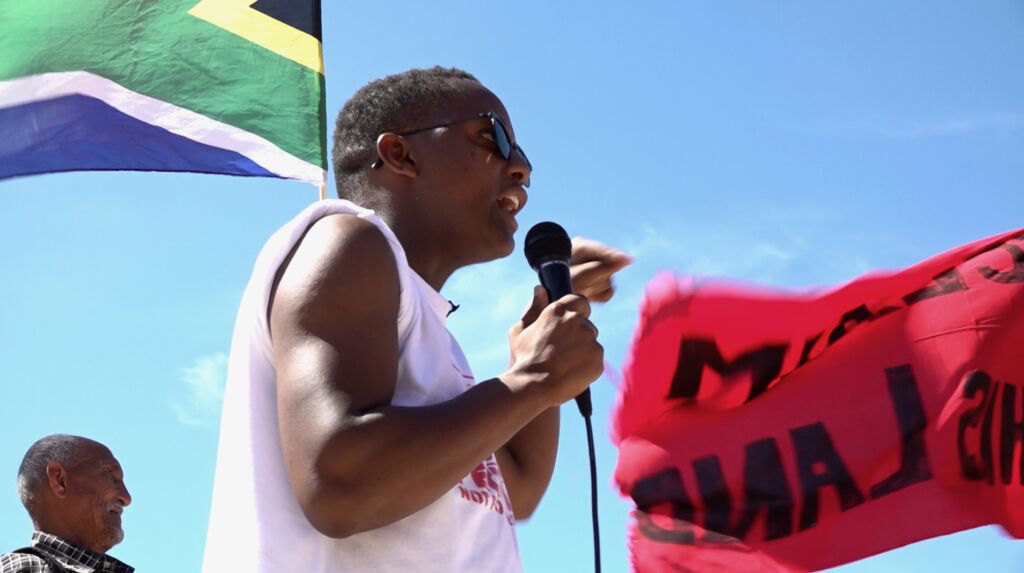
South African housing rights group Reclaim the City is making a big noise for affordable housing in extremely segregated Cape Town. Led by charismatic Nkosikhona ‘Face’ Swartbooi, they take their non-violent fight to politicians, developers, and ultimately to court. A passionate portrayal of a true grassroots movement.
Outreach Project
The outreach plan aims to use impact screenings and community discussions to engage audiences on the constitutional right to housing as a fundamental human right. The programme will host a series of curated screenings across Cape Town, at venues such as the Isivivana Activist Centre (Khayelitsha), Bertha House (Mowbray), and Guga S’thebe (Gugulethu), reaching both communities featured in the film and new audiences beyond festival and academic circles. Four targeted screenings will bring together political and policy officials to encourage dialogue and accountability, while additional community screenings will take place in accessible local centers and cinemas to deepen public understanding and inspire collective action around housing justice.State of Silence
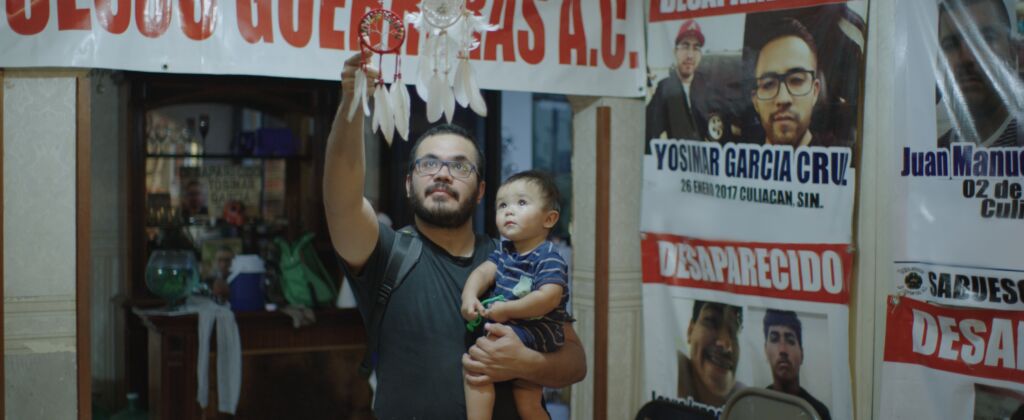
Brave journalists in action in Mexico, where they are attacked, forced into exile and even murdered for trying to report the truth. In a country where drug cartels and the government are an almost equal threat, it takes a lot of courage to keep going. Inspiring documentary about true present-day heroes.
Outreach Project
The outreach project consists of a series of screenings, debates, and Q&A sessions to promote reflection on press freedom, human rights, and the dangers journalists face.In Mexico, events will be held mainly at universities with journalism, communication, and film programs, particularly in regions where freedom of expression is under threat, and will feature conversations with the film’s protagonists and creators. A free discussion guide will be developed as a lasting educational resource on journalism’s role in democracy, press freedom, and support for independent media. Internationally, screenings in collaboration with universities, film festivals, and human rights institutions will foster dialogue between journalists, academics, and audiences from both high-risk and protected environments.
The programme ultimately aims to amplify the voices of threatened journalists, build global solidarity, and inspire the next generation to defend truth and freedom of expression.
-
Mediha
A young Êzidî woman survived kidnapping and enslavement by ISIS and goes on a brave quest. In search for justice, for internal healing, and for her missing parents and brother, in Mediha we see Mediha Alhamad – still only 15 years old – reclaiming her life after her release. It’s an incredibly brave and inspiring journey, which she undertakes with both vulnerability and determination. From opening up about her anxiety attacks to a psychologist, to trying to find her missing mother and young brother. Ultimately, she takes the brave step to try and bring her former captor to justice, something which very few Êzidî women have dared to do. This process, however, means that she has to revisit very traumatic events. ‘I’m scared but I’m trying not to be,’ she says. ‘It’s my dream to speak freely.’
Our Land, Our Freedom
Wanjugu Kimathi is the daughter of Dedan Kimathi, the first leader of the Kenya Land and Freedom Army, also known as the Mau Mau. As a child, Wanjugu was deeply moved by the stories of her mother Mukami – Dedan’s wife – about the Mau Mau struggle. From 1952, they revolted against land expropriations by British colonial rulers. In 1957, Dedan was hanged by the British for possession of weapons. His body was dumped in an unknown location. Following in her mother’s footsteps, Wanjugu continues the years-long search for her father’s body. On her quest through Kenya, she meets Mau Mau veterans, families of other dispossessed individuals, and inspiring activists. Furthermore, she discovers new atrocities and mass graves that the British preferred to keep secret.
-
A Story of Bones
Working for the constructor of an airport on Saint Helena, Namibian Annina Van Neel hears about the discovery of mass graves of formerly enslaved people on the island. When she starts fighting for an honourable resting place, she has to take on resistance, indifference and the persistent legacy of colonialism.
Outreach Plan
Screenings of the films will be organized in as many African regions as possible and with communities of descendants of enslaved Africans globally, especially those engaged in the campaign for cultural heritage restitution. The screenings will be followed by Q&A segments, roundtable discussions or other special events to facilitate substantive conversations. The goal of the campaign is to energize and inspire African descendant communities and the diaspora to express individual and collective agency as the legitimate authorities to their heritage.Category Woman
Who decides when a human body is ‘normal’? The athletics federation bans women with higher natural testosterone levels from competing unless they medically alter their bodies. Examples of athletes from Asia and Africa show that this can have devastating consequences. Phyllis Ellis (Toxic Beauty) exposes an industry controlled by men putting women’s lives at risk.
Outreach Plan
The plan is to organise two high profile screenings in Geneva at Sporting Chance Forum, presented by The Centre for Human Rights and Sport and the Office of the United Nation High Commissioner of Human Rights. The screenings will be followed up with talkbacks featuring the work and activism of Payoshni Mitra and Annet Negesa. These screenings will be attended by international stakeholders at the highest level of many areas of world sport as well as the influencers, decision makers, and defenders of human rights violations in sport. The goal is to use this opportunity, with so many international sport influencers in one room, to impact and influence action against discriminatory regulations in sport and to create pressure on International sport to remove the regulations from all women’s sports.Mama Bears
What happens when your child is gay or transgender, while you believe with your whole heart that that’s a sin? Evangelical Christians Kimberly and Sara make a brave transition into loving ‘Mama Bears’. Meanwhile, young Tammi struggles with self-acceptance and with her own mother. Heart-warming documentary about love’s victory over hatred.
Outreach Plan
Through a curated series of church screenings, the plan is to bring film to the most conservative parts of the country with pending legislation. Mama bears, their children, other LGBTQ people, and affirming pastors and theologians will be invited to engage with audiences in “compassionate conversations” to jumpstart and keep these vital conversations going. Additionally, screening guides will be created that allow audiences to hold their own discussions around the film. The goal is to galvanize parents of LGBTQ+ people not only to love and accept their children unconditionally but to show their love through their votes against harmful legislators and legislation.The Flag
Following the 2015 terrorist attacks in Paris, France declared the state of emergency. This set in motion an exit from the rule of law, with Muslims as the first, but not the only victims. Urgent, philosophical and visually interesting plea in defence of civil liberties and equality.
Outreach Plan
The plan is to screen the film in working-class neighborhoods, cinemas, social centers and media libraries and specifically to the population targeted by state-sponsored violence. The screenings will be attended by activist Yasser Louati, director Joseph Paris, the researchers who contributed to the film, and activists from partner associations. The aim is to inform, explain and raise awareness on state racism and police violence as well as to provide intellectual tools for political resistance. -
Eternal Spring (長春)
The thrilling and emotional story of a group of Falun Gong practitioners who managed to shortly take over Chinese state TV. A story of immense bravery and life under totalitarian rule.
Outreach Project
Screening of the film will be organised in areas with large Chinese diaspora populations (including displaced Falun Gong communities) and with human rights organizations. In different regions of the world they will work together with community groups, Chines activists, non-profit organizations, and well-networked individuals. Most screenings will be followed by Q&A’s involving these groups, local Falun Gong practitioners, government representatives and also Daxiong himself. The goals of the larger impact and outreach campaign include humanizing the Falun Gong practitioners impacted by the persecution and spark a conversation on the importance of freedom of expression and religion in society.On These Grounds
After a classroom video of police violence against a black girl goes viral, a heated national debate erupts. Whose fault is it? Was it racist? And why are police officers patrolling US schools anyway? Activist Vivian Anderson uproots her life to help the girl, and also confronts the officer.
Outreach Project
With the outreach screenings they plan to screen the film in schools and on Capitol Hill. The goal is to train educators and policymakers to advocate for reducing police presence in schools. Conversations following the film will be organized around community solutions and include film protagonists, filmmakers, experts and community members. In total 50 screenings will be organised aiming to reach 10.000 people.Bigger Than Us
Dutch-Indonesian environmental activist Melati (20) goes on a road trip, meeting young people who work for a better future. From Malawi to Brazil to Lebanon, young activists rise up for free speech, the environment, food security , climate change, racism refugees and girls’ rights, and the right to education.
Outreach Project
With the outreach screenings they plan to back to each country from the film to share the film with the protagonists and their community. In each country working together with the activist in the film the film will be screened in universities, schools, and with local NGOs and authorities and the community of each protagonist. The protagonists will be involved with the post screening Q&A’s also inviting local activists on the ground. The main target group is youth.The Territory
The small and shrinking indigenous Uru-eu-wau-wau people in the Amazon are threatened by land grabbers. They choose 18-year-old Bitaté as their leader, and together with activist Neidinha he is determined not to roll over. But when Jair Bolsonaro becomes president, the forces attacking them get free reign.
Outreach Project
The outreach project involves a traveling film series, screening the documentary in indigenous villages and cities in 4 different regions of the Amazon in Brazil. Local indigenous activists, filmmakers, producers and teachers will be invited to join for Q&A’s and panel discussions. Amplifying indigenous voices and protecting indigenous land are two of the main goals of the screenings which are part of a larger international impact campaign. -
A La Calle
Insightful documentary chronicling the massive Venezuelan protests of 2017 and the contested presidential elections two years later. With a wide range of voices, from medical workers and a barber to opposition leaders and supporters of president Maduro. Telling a story playing out throughout the world today: that of authoritarianism versus democracy.
Outreach Project
The goals of the outreach project is to raise awareness, inspire people to take action and to do advocacy for the humanitarian and political situation in Venezuela. By organising virtual screenings, high level panels and a strong social media campaign international attention will be created between August and December 2021.Fly So Far
Inspiring portrait of Teodora del Carmen Vásquez from El Salvador. After her baby was born dead, she was convicted to thirty years imprisonment for aggravated homicide. In prison she finds out that she is not the only one. Together, the women decide to take a stand. The women called themselves ‘The 17’, and Vásquez became their spokesperson.
Outreach Project
With the impact campaign the film team together with Teodora will organise screenings in the capital San Salvador followed by screenings in several communities in El Salvador. The screenings will be followed by conversations with ‘the 17’, local communities and organisations. A booklet with information about reproductive rights & health will be made and handed out to the audience.Nasrin
Secretly filmed personal portrait of Iranian human rights lawyer Nasrin Sotoudeh. The fact that she is currently in prison for standing up for human and women’s rights, makes this documentary all the more urgent.
Outreach Project
The outreach project focuses on creating even more awareness for Nasrin’s case and freedom and to spark awareness, concern, and action on behalf of human rights and at-risk activists around the globe. The activities will take place between August 2020 and March 2021 and include screenings of the film in multiple countries, online panels, a social media campaign and the first in-persons screening of the film in the USA. -
Maxima
Peruvian shepherdess Máxima Acuña takes on a gold-mining giant wanting to remove her from her land. The odds are against her: the company has police backing, and very deep pockets indeed.
Outreach Project
The outreach project consists of (online) screenings in the US and Peru followed by Q&As with Máxima, her lawyer and director Claudia Sparrow. It will give audiences the possibility to learn more about the (environmental) impact of gold mining and helps to make well informed decisions. The screenings will take place in the fall of 2020 and are linked to an interactive website with all kinds of possibilities to (financially) support Máxima and her family.Objector
Atalya is a 19-year-old faced with the biggest dilemma of her life: should she follow the order to enlist in the Israeli army?
Outreach Project
With the help of the outreach project, screenings of the film in Israel and the Palestinian Territories will be organised from October 2020 – October 2021. They will be followed by Q&As with Atalya, her brother and director, to promote dialogue, and show young people there is an alternative path outside military service. They will also develop the Objector Dicussion Guide including facts and figures about the theme of the film and an Action Guide highlighting various campaigns and organisations.Softie
Sick and tired of the corruption and tribal hatred in Kenyan politics, news photographer Boniface Mwangi decides to run for a seat in parliament.
Outreach Project
The outreach project consists of (online) screenings of the film in Kenya followed by Q&A’s with Boniface linked to an interactive Citizen’s Handbook on a website as an impact tool for stakeholders, changemakers and the audience. The project also involves the Kenian national premiere and TV broadcast and aims to inspire the ‘movable middle’ in Kenya to become more active citizens. This will all take place between September 2020 and April 2021.Mrs F.
Nigerian theatre director Ifeoma Fafunwa descends on the floating slum of Makoko to stage her play about female oppression. Starring brave local women who slowly but surely work up the courage to speak the truth in front of their whole community.
Outreach Project
With the outreach project the film will be screened on the main community square in Makoko and followed by discussions with chiefs and kings of the community, the protagonists, religious leaders, the local “performers” and of course the audience. The goal of the screenings is to create more awareness about an equal society for all and discuss the current of male dominance and inequality. Additional screenings at cultural institutions and universities are planned, taking place in the first half of 2021. -
Grit
Fifteen Indonesian villages are buried under a thick layer of grit, creating an ominous moon landscape. The villages were devastated by a huge mudslide as a result of gas drilling operations. After narrowly escaping the churning mudflow as a child, Dian Maharani now claims justice. Together with her mother, she stands up against exploration company Lapindo, that declines all responsibility.
Outreach Project
The film is used to bring together various communities, each of which are struggling to defend their right to a healthy environment. The screenings will be held in at least six communities that have support groups/NGO’s. Film screenings are followed by a Q&A with a local activist and local academic or NGO representative.Unpaved Road to Peace
As teenagers, they decided to fight for FARC. Now that a peace agreement has been signed in Colombia, the children of Caldono return to their bombed village. The question is how the villagers will welcome them: with forgiveness or retaliation?
Outreach Project
The documentary will be screened in six rural villages in the Cauca department of Colombia that are among the most attacked villages during the war between the Colombian government and the FARC rebels. After the film a Q&A is organised with the protagonist of the film Farid, a victim and an ex FARC rebel to find common ground and ways for reconcillations.
Newsletter
Do you want to stay up to date with all Movies that Matter news, promotions and special screenings? Sign up for our newsletter.
Subscribe to our Industry newsletter or Educational newsletter (in Dutch) here